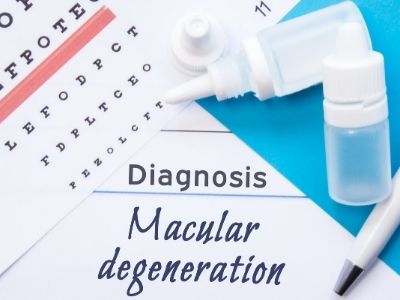
Age-related macular degeneration (AMD) is a leading cause of legal blindness in the United States in persons 50 and older. It is a progressive degeneration of the macula, or the central retina. While the exact cause(s) are not completely understood, there is a definite genetic, or hereditary component. Those with with a family history of macular degeneration, such as a parent or sibling with AMD, are 3-4 times more likely to develop the condition in their lifetime.
Warning Signs and Symptoms of Age-Related Macular Degeneration
AMD is usually a slow, painless loss of vision. With any slow onset medical condition, routine exams are the best way to catch the early signs. Some early warning signs of AMD include:
- Shadowy areas in your central vision
- White areas in your central vision
- Fuzzy or distorted vision
- Diminished or changed color perception
- Straight lines appear distorted
AMD Prevention
Lifestyle choices play a significant role in reducing your chances of age-related macular degeneration. Avoiding obesity, high blood pressure, and high cholesterol can be done with healthy lifestyle choices:
While there is no cure for AMD, there is some positive news. There are several behaviors or actions we can take to protect our eyes from the effects of AMD, help to slow the progression of the disease, or decrease the severity of the disease. In addition, several treatments are available, and more are being developed.
Smoking Cessation
Cigarette smoking is considered the #1 modifiable risk factor associated with AMD. In general, smokers are 2 to 4 times more likely to develop AMD.
Cigarette smoke contains oxidants, compounds that travel to the eye and cause damage to cells in the macula. Some studies indicate that those with a genetic predisposition to AMD who smoke are 20x more likely to develop AMD.
Smoking also narrows blood vessels, which can affect blood flow to the eye. This can make the macula more susceptible to damage. As eyecare providers, our first recommendation to ANY patient with a family history of macular degeneration, or evidence of AMD, is to stop smoking cigarettes.
Self-testing
You can perform a simple, yet sensitive test at home … the Amsler grid. Perhaps your doctor has provided one, or you can easily download and print a copy at https://www.macular.org/amsler-chart.
Just follow the directions, and remember to test one eye at a time. The grid is designed to detect small changes in our central vision, specifically the type of distortion produced by macular degeneration.
Regular Eye Examinations
Finally, routine eye examinations are critical to
- Earlier detection of disease, and
- To monitor any progression
The eye doctor can generally see signs, during a regular dilated eye exam, of early macular degeneration prior to the patient reporting any visual symptoms. Additionally, newer testing and imaging devices in our offices can detect other early signs and markers of disease.
Early detection leads to more effective monitoring of progression, earlier intervention, and more timely treatment of high risk individuals. Much of the vision loss associated with AMD is permanent and irreversible; therefore, it is key that patients be monitored regularly, and treatment started early in the disease process.
Nutrition and Diet
The Age Related Eye Disease Study (AREDS) almost 20 years ago provided evidence that certain vitamins, minerals and antioxidants — vitamins C and E, plus copper, lutein, zeaxanthin and zinc — can reduce the risk by about 25 percent that AMD will progress. We get these by eating antioxidant-rich foods such as dark green, leafy vegetables (spinach, kale), broccoli, carrots, and fresh fruits. Omega-3 fatty acids (from fish and nuts) are thought to have an antioxidant, positive effect on macular health. Alternatively, several multi-vitamin supplements are available in health sections of stores, which are specifically formulated for AMD prevention.
An overall healthy diet, with fewer processed foods, is also associated with less obesity and hypertension, which are both associated with AMD progression.
There are a growing number of studies that show eating a healthy diet may be one of the most effective ways to prevent or reduce the symptoms of AMD and other vision problems. Here’s a list of the nutrients thought to help prevent the progression of AMD and some of the foods they can be found in:
Antioxidants
Antioxidants, such as beta-carotene and vitamins C and E, have been shown to lower the risk of developing advanced AMD by almost 25 percent. Oranges and other citrus fruits, peppers, broccoli, and strawberries are just a few sources of vitamin C; carrots, cantaloupe, sweet potatoes, spinach, apricots, winter squash, spinach, and fruits are great sources of beta-carotene; and you can get your vitamin E fix from foods like broccoli, spinach, almonds, peanuts, and hazelnuts.
Vitamin D
Vitamin D is an antioxidant, anti-inflammatory nutrient that may protect against AMD and other age-related vision loss. Whole milk, eggs, cereals, fatty fish (like cod, tuna, salmon, and halibut), and orange juice are just a few of the delicious sources of vitamin D.
Omega 3 Fatty Acids
Foods rich in omega-3 fatty acids are believed to play a role in the health of the retina’s photoreceptor cells. Good sources of Omega 3 fatty acids include cold-water fish (such as salmon or sardines), walnuts, Brussel sprouts, spinach, yogurt, and eggs.
Zinc and Copper
Zinc is important for the production of melanin, a pigment that protects the eye. Cataracts, poor night vision, and other vision problems have been linked to zinc deficiency. Zinc is also thought to slow the progress of AMD as well. You can get plenty of zinc from eating (low fat) red meats (such as beef, pork, and lamb), whole grain cereals, whole-grain bread, oysters, poultry, beans, and certain dairy products.
Copper has also been shown to slow the progression of AMD. You can get the copper you need from eating dark leafy vegetables, nuts, eggs, seeds, and legumes.
Carotenoids
Two carotenoids found in the macular region of the retina — lutein, and zeaxanthin — are believed to protect the eyes by filtering out harmful wavelengths of light. It’s hard for our bodies to produce the necessary amounts of these two carotenoids, so we can help by eating kale, spinach, collard greens, turnip greens, egg yolks, and other foods containing lutein and zeaxanthin.
(NOTE: Remember to check with your doctor before making changes to your diet.)
What Not to Eat
Certain types of fat — vegetable, monounsaturated and polyunsaturated fats, as well as linoleic acid — commonly found in highly processed food such as margarine, store-bought cakes and cookies, potato chips, peanut butter, and French fries are thought to raise the risks of developing AMD.
Living with Age-related Macular Degeneration
AMD causes vision loss but not necessarily total blindness. Most patients retain their peripheral vision. Daily activities such as driving, reading, watching television, using a computer and going up and down the stairs can be a challenge. However, with a little preparation and perseverance, anyone can learn to live with the symptoms of age-related macular degeneration.
Changes Around the Home
There are many things you can do to make it easier to get around the house and perform your daily activities. Getting rid of low furniture, movable rugs, and clutter can reduce the risks of falls. Avoid fire hazards by using a microwave instead of an oven or stovetops. Apply large print labels to identify medications and other household items. Install brightly colored carpeting. Contrasting colors also make things more visible.
Proper lighting plays a big part in making your home safer. Use bright light bulbs and lamps that can be swiveled or moved to direct the light where it’s needed. Night lights are a great idea. Reduce the effects of glare with drapes, blinds, tinted or polarized glass and choose furnishings with a flat or matte finish.
Other considerations to make moving around your home easier include:
- Make sure thresholds are flush with the floor (no bumpy transitions between rooms) and remove interior doors.
- If stairs are unavoidable, mark each step with bright tape or paint them contrasting colors for better visibility.
- Install grip bars near toilets, showers and bathtubs.
- Buy skid-free bathroom floor mats in bright colors.
Powerful glasses and magnifiers will allow you to continue to read. Large print books are easily available from libraries and online retailers. So are audio books. Both Windows and Macintosh computers have controls that make it easy for visually impaired people to adjust things like font size and screen contrast. And of course, the larger your computer or television screen the better.
Don’t Let AMD Get To You
It’s not uncommon for people who lose vision to go through a period of depression. Some of the ways people with AMD can cope include:
- You’re not alone – join an AMD support group
- Participate in social media
- Seek professional counseling
- Start a hobby
- Get out and about – even if you can’t drive, there are alternate forms of travel such as taxis and buses.
- Reach out to family and friends
Have You Noticed Changes in Your Vision?
If you notice changes in your vision, don’t hesitate to contact a Houston macular degeneration specialist at Berkeley Eye Center. For more than 60 years, we have been dedicated to protecting and preserving the vision of Texans. We have 21 convenient Houston locations that provide a complete range of services, from diagnosis and treatment of eye diseases to regular eye examinations, LASIK surgery, and custom eyewear and contact lenses.
